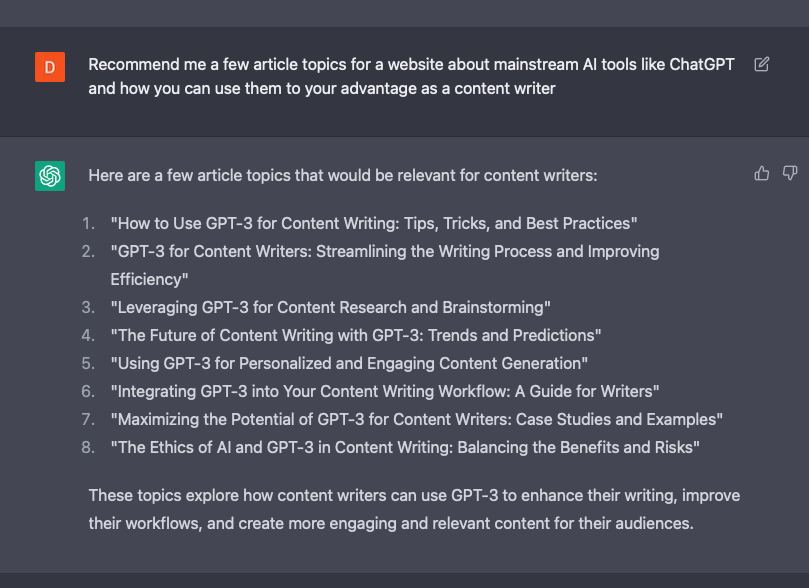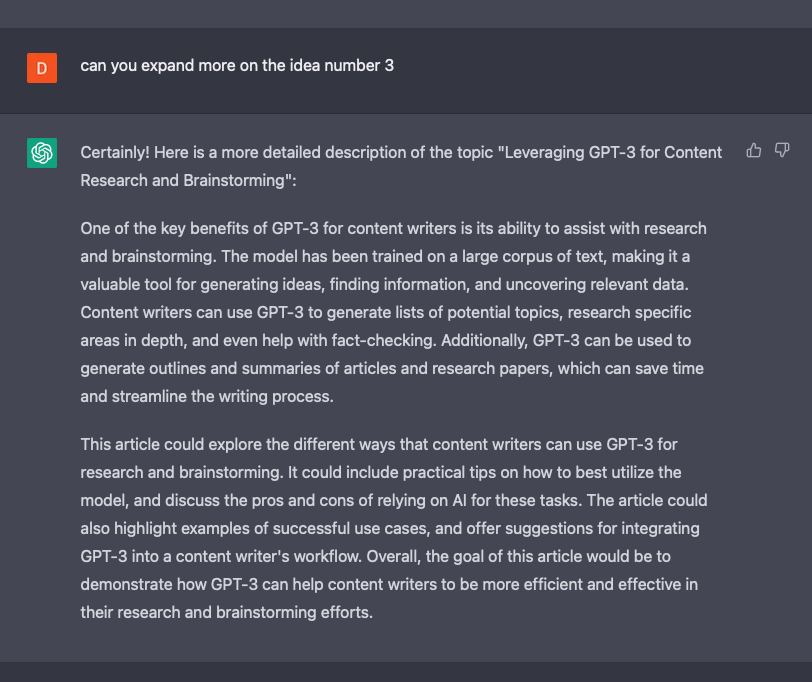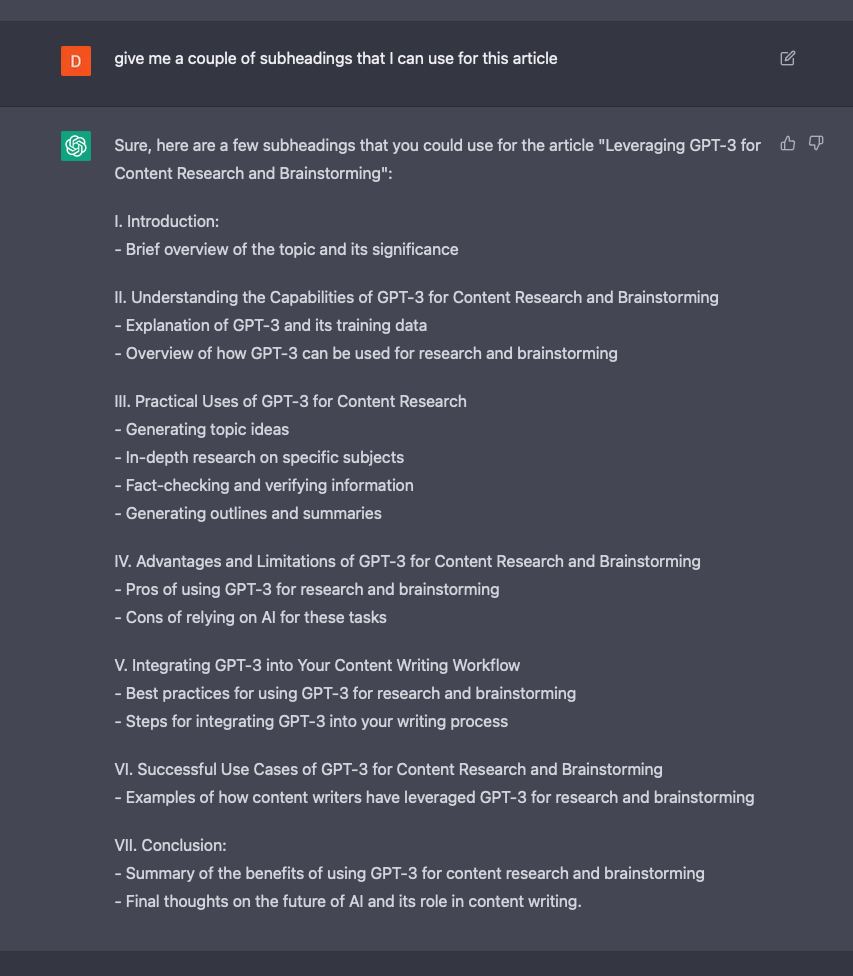I've been a content writer for more than twelve years. I'm also friends with a lot of people who share the same profession. If there is one thing we can all agree on, it's that brainstorming and research is the most time-consuming task in the writing process.
I believe it's my obligation to everyone who reads my articles to always provide helpful and accurate information. This is easier said than done. You also tend to feel quite lonely when you spend hours upon hours taking in information without having anyone to bounce ideas off of. That all changed a while back.
ChatGPT came out in late November 2022 and I began experimenting with it a few days later. It didn't take long before I felt like I had a genius colleague that was always there to talk with me and help me with dull tasks. Now not a day goes by that I don't use this precious AI tool.
Can ChatGPT Really Help Me Brainstorm and Research Content?
There's no question about it. Don't believe me? The whole idea for this article was recommended to me by the chatbot the OpenAI team created.

I simply asked the chatbot to recommend a few article topics for this website and I received eight great ideas. I didn’t copy the title of the article verbatim. In fact, I’d normally change it even more and just use the underlying idea behind it as inspiration. But I wanted to make a point here and show how powerful ChatGPT can be for content writers.
Before I get into the topic more, let’s take a minute to talk about how ChatGPT works.
What Is ChatGPT and How Does It Work?
When the radio started becoming a household item in the late 1920s, some people were convinced there were tiny people inside it talking and playing music. Technology evolved faster than most people could comprehend. I'm seeing many people act in a similar fashion when it comes to ChatGPT. That's why I need you to understand three things:
- This is not a superintelligence that has answers to everything.
- You shouldn't expect ChatGPT to give only accurate information when it answers your prompts. You must still do some research and fact-checking!
- ChatGPT should not do your job but instead, be used to help YOU do a better job.
Now that we got that out of the way, we can talk about what ChatGPT actually is and how it works. This AI-powered tool is a chatbot developed by OpenAI that interacts in a conversational way. It is the most advanced chatbot available to the public and is able to reject inappropriate prompts, admit its mistakes, and answer follow-up questions.
ChatGPT was trained using Reinforcement Learning from Human Feedback. In essence, a large group of people helped in training the AI assistant by providing conversations in which they played both the chatbot and the user. Couple that with immense datasets and you get an advanced chatbot that is able to "talk" with you on a huge number of topics.
I tried to condense this explanation as much as possible. It’s almost impossible to explain how it works in a few paragraphs. I’ll get into more detail about it in another article.
Practical Uses of ChatGPT for Content Research
An incredibly interesting feature of ChatGPT is its ability to answer follow-up questions. After I asked it to recommend some topic ideas for an article, I decided to ask a follow-up question. I wanted the chatbot to expand more on the topic idea I liked the most. Here's the answer that I received.

This AI tool has been trained on a large corpus of text, which means that it can generate lists of potential topics. It can also help you research specific topics in depth and help you with fact-checking. This greatly reduces the amount of time you'd need to put into writing an article.
Using ChatGPT to research content and brainstorm enables you to be more efficient. When you begin experimenting with the chatbot, you'll feel like you discovered a superpower. Although it's a bit cliche, I must mention that with great power comes great responsibility.
You should use ChatGPT to both become a more efficient and skillful writer. Don't fall into the trap of letting the chatbot do most of the work for you. Use the time you saved to focus on your craft more and figure out how to deepen the connection between you and the audience through your content. I’d like to think that I’m doing the same right now.
I could’ve simply expanded on what the chatbot wrote and it would’ve been a fine article. But I wanted to give you valuable advice, from one content writer to another. Don’t lose that human touch as you use this exciting technology to your advantage.
When I asked ChatGPT to provide me with more information about the topic I’m covering today, it mentioned how it could generate outlines for articles. I was eager to put this claim to the test.
Generate Article Outlines with ChatGPT
The fact that ChatGPT is able to expand on any article topic it generates is already amazing. It helps you figure out whether the idea is worth writing about.
What's even better is that it can generate outlines for topics. An outline is to the content writer what a blueprint is to an architect. I was wondering what the blueprint for a topic like this would be, so I asked my favorite chatbot.

This is quite an impressive outline. I decided to keep some subheadings but worded them differently. I also felt that some sections would not fit well in the overall article and the particular message that I'm trying to convey. This is the key to leveraging ChatGPT as a content writer. Don’t let it tell you what to do. Tell it what to do and figure out your next steps based on your personal preferences.
Will ChatGPT Replace Content Writers?
I know a lot of people are concerned about AI taking their jobs. These people are so loud that it reminds me of those South Park episodes where they are screaming “THEY TOOK OUR JOBS!” Don’t be afraid of something you don’t understand. AI won’t replace you. If anything, it will make you better at what you do and enable your personality to shine. It will help you streamline mundane tasks and provide you with more time to go on a powerful journey of self-discovery.
I don’t want to get too poetic here, but ChatGPT can help set you free. The problem with writing content is that certain tasks require you to behave mechanically and lose touch with your personality in the process. As soon as you remove the repetitive tasks from the equation (or spend significantly less time doing them), your mood will increase and that will reflect in your content.
Can I Use AI-Generated Topics and Text in My Articles?
This is likely a question you really want to know the answer to. As you’ve probably guessed, it’s completely fine to use AI-generated topics for your articles. But you might find it best to reword them a bit. When it comes to the content itself, it should serve as an inspiration and nothing more. Don’t think that you can do your job simply by entering a few prompts into ChatGPT a day from now on.
You won't be able to fool people with AI-generated text since it didn't take long for ChatGPT's creator to release a free tool that detects if the content was written by a human or artificial intelligence. It also wouldn’t be ethical to copy what the chatbot says word for word, so it’s a shame many writers have misused ChatGPT in the few months it’s been available.
It’s not yet become a standard practice to check whether texts are AI-generated in the content writing world because many people still aren’t aware that a tool like this exists. But it won’t take long for everyone to catch up and begin using it, so don’t get any silly ideas and start cutting corners just because you found a useful tool most of your colleagues still aren’t using.
Final Thoughts
ChatGPT is an AI-powered tool that is available to the public and can be especially helpful to content writers when they are brainstorming and researching ideas. The real beauty of this chatbot lies in the fact that you can have a conversation with it. Essentially, it will feel like you have a brainstorming buddy that you can get in touch with whenever you want.
What's important is that you use the help ChatGPT provides in moderation and only when it makes sense. It's easy to let it do the work for you but it shouldn't be used that way. You should use it to improve your work instead.